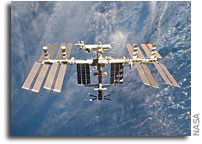Using the ISS Without Going Through CASIS

An announcement this week whereby Teledyne Technologies will be using the International Space Station (ISS) for Earth observation points out a persistent problem with regard to the use of the ISS: who is actually in charge of how Americans are going to use it?
According to this press release from Teledyne Technologies:
“Teledyne Technologies Incorporated announced today that its subsidiary, Teledyne Brown Engineering, Inc., in Huntsville, Ala., was awarded a Cooperative Agreement by NASA to foster the commercial utilization of the International Space Station. Under the agreement, Teledyne Brown will develop the Multi-User System for Earth Sensing (MUSES), an Earth imaging platform, as part of the company’s new commercial space-based digital imaging business. Teledyne expects to provide the first commercial imaging system on board the facility.”
You would think that NASA would be promoting this good news across all of its ISS-related websites and news channels. This is not the case. No mention is made on the CASIS website. No mention is made at the NASA ISS National Lab website either. This is the sort of thing NASA wanted CASIS to be doing? Guess not. It would seem that one does not have to deal with CASIS in order to use the ISS.
According to the CASIS (Center for the Advancement of Science in Space) website: “NASA chose the Center for the Advancement of Science in Space (CASIS) to be the sole manager of the International Space Station U.S. National Laboratory.” Alas this is totally inaccurate since NASA still controls a substantial portion of the utilization of the ISS National Laboratory. Indeed it is in a struggle with CASIS to figure how who utilizes the International Space Station and how that utilization is managed. A year into the CASIS agreement with NASA and this is still not clear.
According to Twitter posts provided last night by CASIS employee Justin Kugler (@phalanx) the TBE agreement was done independent of CASIS: “MUSES was created as a National Lab Enabling project. It is not new. TBE registered with CASIS as an implementation partner” and “TBE is an implementation partner and MUSES preceded the transition. And we have been helping them with potential users.”. Kugler added that “NASA is retaining the projects they are funding because of legal requirements.”
This contradicts efforts underway whereby NASA has been seeking to transfer existing ISS utilization agreements (Space Act Agreements, MOUs etc.) from NASA to CASIS. Not everyone wants to transfer their agreement to CASIS, however. Some companies and organizations that have been contacted by NASA have declined to make the switch. In addition, people are currently going to existing ISS utilization offices at NASA field centers to try and negotiate deals for ISS utilization in areas that CASIS is supposed to be covering because they do not want to work through CASIS.
This begs the question: why does CASIS exist if NASA can ignore it when it wants to? Of course the answer is simple: Congress forced NASA to do this – and this is the way NASA set this whole thing up. NASA retains the right to do some things on ISS while CASIS gets the rest – maybe. There are substantial overlaps between their respective purviews as well as some murky areas and neither entity seems to want to cooperate with the other so as to put forth a cohesive ISS Utilization process for the public to see – and (ideally) make the most of.








